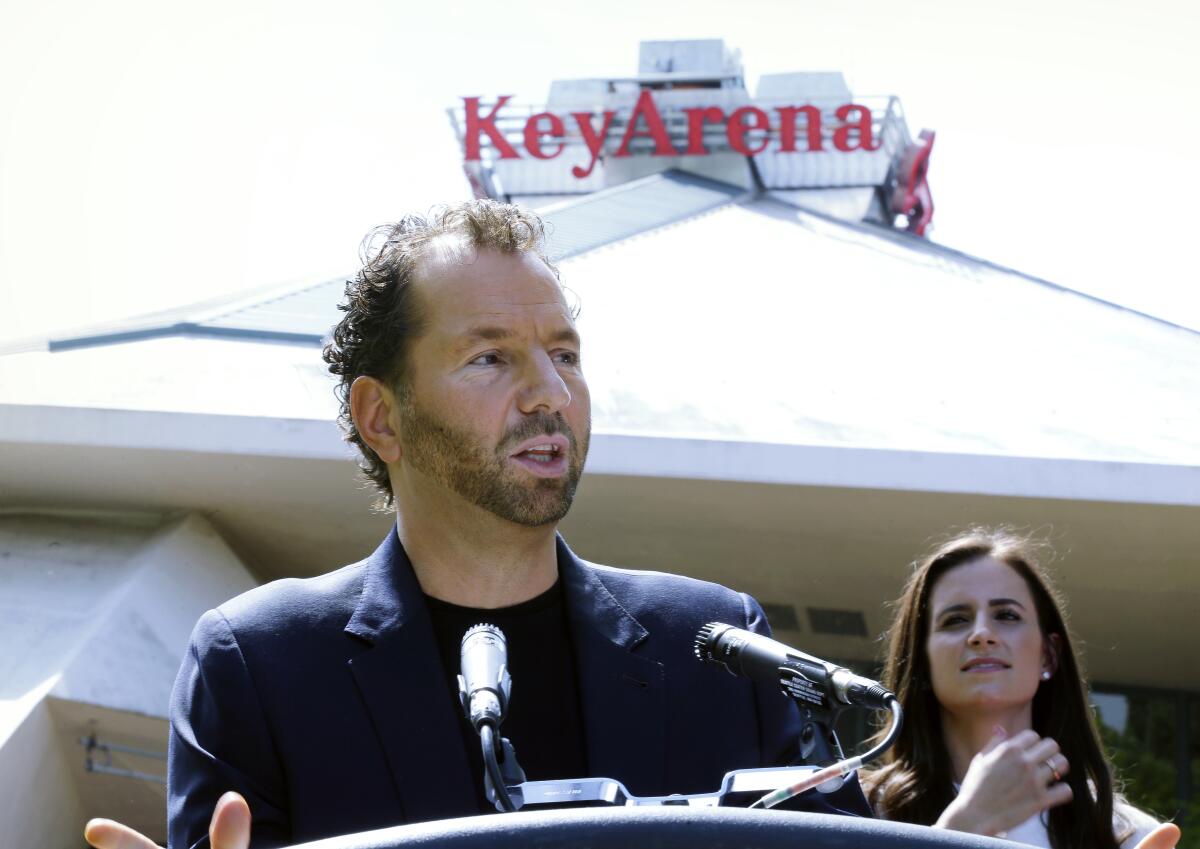Live Nation faces Justice Department action over ticketing practices

- Share via
Live Nation Entertainment, the world’s largest concert promoter, is about to face federal legal action over its ticketing practices.
The U.S. Department of Justice is preparing to take on the Beverly Hills-based live music giant over allegations that it coerced concert venues into working with its Ticketmaster division, according to a person familiar with the matter who was not authorized to speak publicly.
Representatives for Live Nation and the Justice Department declined to comment Friday.
The Wall Street Journal first reported the impending civil action, which is expected to claim that Live Nation violated terms of its 2010 settlement with the government that allowed it to complete its controversial, $889-million merger with Ticketmaster.
The agreement placed conditions on the company that were intended to ensure fair competition in the ticketing marketplace. For one thing, Live Nation was prohibited from retaliating against venue owners that decided to defect to competitors.
The combination of the two companies made Live Nation a colossus with tentacles in multiple areas of the music industry, including concert promotion, ticketing and artist management.
Despite the settlement provisions, critics of the deal feared that the merger would give the firm a stranglehold on ticket sales and other parts of the music business. Consumer groups worried that the agreement would do little to prevent anti-competitive behavior and price gouging.
Ticketmaster has long faced criticism for the fees it charges consumers, and there has been political pressure for antitrust officials to get involved.
The expected federal action comes a few months after Sen. Richard Blumenthal of Connecticut and Amy Klobuchar of Minnesota, who are both Democrats, sent a letter to the Justice Department’s top antitrust official, Makan Delrahim. The lawmakers described a “broken” ticket industry plagued by “exorbitant fees and inadequate disclosures,” and called on the agency to investigate the situation.
The senators’ August letter specifically took aim at Live Nation, citing “disturbing reports that” the company “has flouted” the conditions of the 2010 consent decree.
In response, Live Nation at the time said in a statement that the senators’ complaints were “based on a fundamental misunderstanding of our consent decree and general ticketing industry dynamics” and that there was no cause for further investigation.
“Ticketmaster has been successfully growing its client base over the past decade as a result of continuous innovation and providing the best ticketing solution in the industry,” the company said. “During that period, Live Nation and Ticketmaster have always complied with their obligations under the consent decree. We do not force anyone into ticketing agreements by leveraging content, and we do not retaliate against venues that choose other ticketing providers.”
Competitors have also tried to do legal battle with Live Nation. For example, the online ticket-selling start-up Songkick in 2015 filed a David-and-Goliath antitrust lawsuit against Live Nation, saying Ticketmaster has used its clout to try to “destroy competition” in the artist presale market.
The parties settled the dispute in 2018, in a deal that resulted in Live Nation buying some of Songkick’s assets. In 2014, Ticketmaster agreed to issue $400 million in credits to ticket buyers to settle a class-action lawsuit over processing fees.
It wasn’t immediately clear what terms the Justice Department would accuse Live Nation of violating in its action.
The 2010 settlement is expected to expire next year, but the Justice Department plans to ask the court to extend the conditions placed on Live Nation, the source said.
Antitrust lawyer David Balto, who had advocated against the merger, said the Justice Department’s coming action was a sign that the company’s alleged practices had gone “beyond the pale” in the agency’s view.
“It takes a lot to get the DOJ to take an enforcement action for violating an order like this,” Balto said.
Once filed, the action would be the department’s latest regulatory move in the broader entertainment industry. Last month, Delrahim’s office asked a judge to toss decades-old consent decrees governing film studios and movie theaters.
The so-called Paramount decrees, which were entered between 1948 and 1952 to break up Hollywood’s monopoly over distribution and exhibition, are obsolete in the modern entertainment business, Delrahim said.
More to Read
Inside the business of entertainment
The Wide Shot brings you news, analysis and insights on everything from streaming wars to production — and what it all means for the future.
You may occasionally receive promotional content from the Los Angeles Times.











